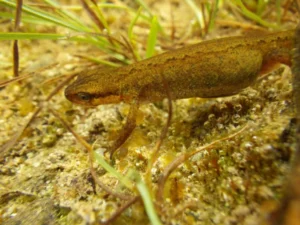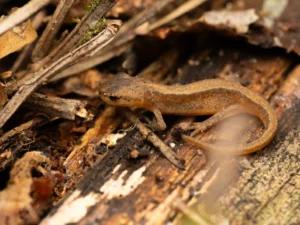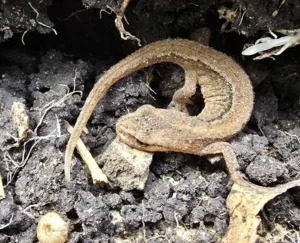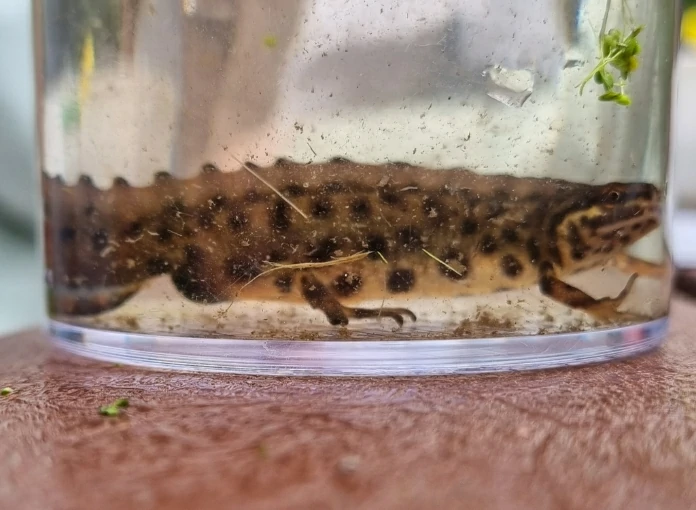When you watch a newt moving slowly across a cool morning garden path, you might notice how its activity seems tied to the temperature around it. So are newts cold blooded?
Yes, newts are cold blooded. That means they can’t control their body temperature inside like mammals or birds do. Instead, their body temperature matches the temperature around them, and they rely on outside heat sources, like sunlight, to warm up.
This cold-blooded nature affects almost everything about how newts live, from when they’re active during the day to where they spend different seasons.
What Does Being Cold Blooded Actually Mean?
When scientists say an animal is cold blooded, they’re not talking about the temperature of its blood. They’re talking about how the animal controls its body heat.
Cold-blooded animals, also called ectothermic animals, get their heat from their surroundings instead of making it inside their bodies.

This is very different from warm-blooded animals like mammals and birds.
Warm-blooded animals make heat through their metabolism and can stay at a steady temperature even when it’s cold outside.
A mouse stays warm in winter, but a newt becomes as cold as the air around it.
Research shows that this system works very well for many animals.
Cold-blooded animals use much less energy because they don’t have to burn calories just to stay warm.
How Do Cold-Blooded Newts Stay Warm?
Since newts can’t make their own heat, they’ve learned to find it in their environment.
You’ll often see newts basking in sunny spots during cool parts of the day, soaking up warmth like tiny solar panels.
Newts also move to different locations throughout the day to manage their temperature. They might climb onto warm rocks, sun-heated paths, or other surfaces that have absorbed heat.

On very hot days, they do the opposite and move to shady spots to avoid overheating.
Dark surfaces are especially good because they hold heat better than light ones. That’s why you might see newts on dark rocks, asphalt paths, or other sunny surfaces.
Why Don’t Newts Freeze in Winter?
You might wonder how cold-blooded newts survive freezing winter temperatures without making their own heat. Many newts have special ways to handle extreme cold.
During winter, most newts enter a state like hibernation called brumation.
They find protected spots underground, under logs, or in other safe places where temperatures stay more stable.
Their metabolism slows way down, and they become almost completely inactive.
Some newts can even survive having parts of their bodies freeze solid.
They produce special proteins that act like antifreeze, stopping ice crystals from forming inside their cells and causing damage.
How Does Being Cold Blooded Affect Newt Activity?
Being cold blooded has a big effect on when and how active newts are. On cool mornings, they move slowly and may seem sluggish because their body temperature and metabolism are low.
As the day warms, newts become more active. They move faster, hunt more, and respond more quickly to their surroundings.

This daily cycle tied to temperature is very different from warm-blooded animals.
During breeding season, water temperature is especially important because newts spend most of their time there.
Warmer water can speed up courtship, egg development, and overall reproductive success.
Do All Amphibians Share This Cold-Blooded Nature?
Yes, all amphibians, including newts, salamanders, frogs, and toads, are cold blooded. This is one of the main things that separates amphibians from birds and mammals, along with their moist skin and need for water to reproduce.
Being cold blooded is an ancient trait shared with reptiles, fish, and most other animal groups. Warm-blooded animals, like birds and mammals, are actually the unusual ones.
They evolved this energy-hungry heating system relatively recently.
This shared cold-blooded nature explains why different amphibians are often found in similar environments and why they’re more active at certain times of day and year.
Are There Any Advantages to Being Cold Blooded?
Being cold blooded might seem like a disadvantage, but it has big benefits. The biggest is energy efficiency. Cold-blooded animals need much less food than warm-blooded animals of the same size.
A newt can go weeks without eating if it needs to. A mouse of the same size has to eat constantly to keep its body warm.

This means newts can survive in places where food is scarce or unpredictable.
Research shows cold-blooded animals usually need only about 10% of the food that warm-blooded animals do.
This lets newts thrive in habitats that couldn’t support warm-blooded animals.
How Fast Can Cold-Blooded Newts Move?
A newt’s speed depends a lot on its body temperature, which depends on the environment. In cool conditions, they move slowly, almost like they’re in slow motion.
When their body temperature is just right, usually between 60-75°F for most species, they can move surprisingly fast.
They can make quick bursts to escape predators or catch prey, though they can’t keep that speed for long.
The link between temperature and speed is so strong that scientists can predict how fast a newt will move just by measuring the air or water around it.
Can Newts Control Their Temperature at All?
Newts can’t make internal heat, but they’re not helpless. They use smart strategies to keep their body temperature in the right range.
They choose when and where to be active based on temperature. They might hunt in the warmest part of the day in spring but switch to morning or evening in hot summer weather.

They also use microhabitats (tiny areas with different temperatures) to fine-tune their heat.
A newt might move a few inches from sun to shade to cool down, or from grass to a warm rock to heat up faster.
What Happens When Newts Get Too Hot?
Getting too cold is dangerous for newts, but so is overheating. They can’t sweat or pant like mammals, so they rely on behavior to stay cool.
When it’s very hot, newts hide in cool, moist places. They might burrow into damp soil, hide under logs or rocks, or go to the deepest parts of ponds where the water is cooler.
Their moist skin helps a little with cooling. As water evaporates, it can take some heat away.
But this also means they lose moisture, so they have to balance cooling with staying hydrated.
How Does Cold Blood Affect Newt Reproduction?
Being cold blooded affects reproduction a lot. Most newts breed when the weather is warm so their metabolism is high and they have enough energy for courtship and egg-laying.
Water temperature is very important. Warmer water speeds up egg development, while cooler water slows it.
Newts in warmer areas might have longer breeding seasons than those in cooler places.
This temperature-dependence also means climate change could affect newt populations, since changing temperatures can change the timing and success of breeding.
Conclusion
Now you know that yes, newts are definitely cold blooded. This one trait shapes almost every part of their lives.
From daily activity to seasonal behavior, being cold blooded affects how newts interact with their environment and survive in the wild.
It might seem limiting compared to mammals and birds, but this energy-saving lifestyle has let newts thrive in many environments where being efficient gives them a real advantage.
Hi, my name is Ezra Mushala, i have been interested animals all my life. I am the main author and editor here at snakeinformer.com.

